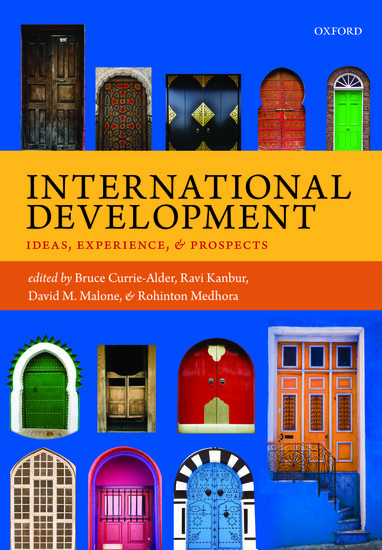By Bruce Currie-Alder
Is thinking on international development pulling itself together or tearing itself apart? The phrase ‘international development’ can be problematic, embracing multiple meanings to those inside the business, but often meaningless to those outside of it.
On the surface, the Millennium Development Goals and debates towards a post-2015 agenda imply a move towards consensus. The past 60 years saw the development agenda embrace political independence, economic growth, human needs, sustainability, poverty reduction, and human capabilities. Each represented a particular understanding of what constitutes “development” and how to achieve it. Once dominated by economics and political science, the ideas and concepts used to explain development now draw on insights from across the natural and social sciences. Beyond academic debate, such ideas motivate real-life organizations and practitioners and shape their actions.

After interacting with over 90 writers over three years, I am convinced that thinking on development is tearing apart. Contemporary thinking comes from an increasingly diverse set of locations, with Beijing, New Delhi, and Rio de Janeiro challenging and enriching the ideas emanating from London, New York, and Paris. The rise of regional powers and localized approaches to development are reshaping our understanding of how human societies change over time. Fundamentally, the policy space for “international development” is tearing into three separate dialogues.
Sovereign problems concern the use of national wealth. All polities face real constraints in public finance and our societies face analogous challenges, such as: expanding access to and improving the quality of education and health, designing social protection to ensure a minimum wellbeing for everyone, or encouraging opportunities for entrepreneurs and minorities. Dialogue and action on sovereign problems involve national treasuries, political parties, and (mis)informed citizens. One can be inspired by experience abroad, but solutions must be tailored to fit within local cultural, political, and economic reality. This aspect of international development is growing.
Common problems concern international public goods. A sizable portion of our problems spill across borders and potential solutions require cooperation among different polities. Climate change, emergent diseases, and trade regimes surpass the ability of any one country and are affected by the choices made by others (indeed the nation-state is seldom the most useful unit of analysis). Common problems involve separate actors, ranging from municipalities and hospitals, to trade negotiators and the alphabet soup of international forums (IPCC, WHO, IFIs). After the rise of globalization, this aspect of international development is holding steady given the reality of a multi-polar world.
Foreign problems concern how to respond to troubled places abroad. Six decades of development saw substantial increases in life expectancy, human rights, and literacy. Yet there remains a stubborn set of poverty hotspots, ungoverned spaces, and fragile states where life continues to be nasty, brutish, and short. Dialogue and action involve foreign ministries, aid agencies, and NGOs. There are encouraging signs that this aspect of international development is in decline. The long-term trend witnessed a decrease in inter-state conflict and a dwindling list of low-income countries reliant on foreign aid. As such, the agenda is narrowing towards humanitarian relief, rural development, and state-building in remote locations.
This triad of sovereign-common-foreign offers one potential typology for the future evolution of thinking currently gathered under “international development”. Put more simply, when world leaders meet, the problems they discuss fit into the categories of mine-ours-theirs: those involving dialogue at home, those that require coordinated action across borders, and those related to hotspots beyond our borders.
In short, the label of “international development” has outlived its usefulness and is tearing apart in both academics and practice. For example, in the United Kingdom there is a tension between “development studies” focused on low-and-middle income countries, and “development sciences” applying technology to the needs of the poor. Meanwhile the range of organizations that engage in development has expanded, diversified, and coalesced into specialized communities. Once the exclusive purview of aid agencies and international organizations, there is an increasingly role for national treasuries, domestic charities, and diasporas in addressing different problems.
Looking forward, it seems likely that what is described as “international development” is destined to become a historic juncture, describing a period when we jumbled things together differently.
Bruce Currie-Alder is Regional Director, based in Cairo, with Canada’s International Development Research Centre (IDRC). He is an expert in natural resource management, and on the policies that govern public research funding and scientific cooperation with developing countries. His previous experience includes facilitating corporate strategy, contributing to Canada’s foreign policy, and work in the Mexican oil industry. He co-edited International Development: Ideas, Experience and Prospects (Oxford 2014) which traces the evolution of thinking about international development over sixty years. Currie-Alder holds a Master’s in Natural Resource Management from Simon Fraser University and a PhD in Public Policy from Carleton University.
Subscribe to the OUPblog via email or RSS.
Subscribe to only business and economics articles on the OUPblog via email or RSS.


Recent Comments
There are currently no comments.